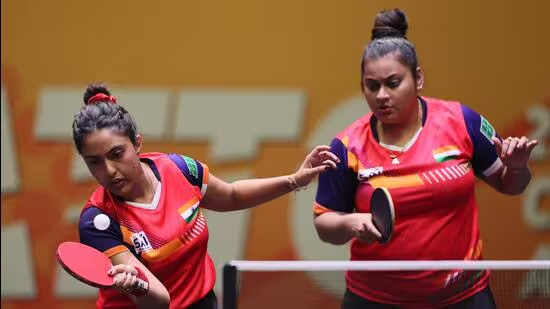14 october 2024 : Before the Indian team departed for the Asian Table Tennis Championships, coach Soumyadeep Roy reminded his trainees, Ayhika Mukherjee and Sutirtha Mukherjee, of their goal to secure a podium finish in Astana, Kazakhstan.
What might have seemed overly ambitious just a couple of years ago now felt achievable. The Mukherjees demonstrated this potential by winning a bronze medal after losing to Japan’s Miwa Harimoto and Miyuu Kihara in the semifinals, with scores of 4-11, 9-11, and 8-11.
While they may feel some disappointment at not advancing further—having previously defeated the Japanese pair—their success symbolizes India’s overall campaign, which brought home three bronze medals, a notable improvement from the single podium finish in the last edition.
The women’s team not only secured medals in the team event but also achieved notable firsts in doubles. Alongside powerhouse China, India was the only country to earn medals in both team competitions.
“India is no longer viewed as an unpredictable opponent but as a dangerous one,” said Massimo Costantini, India’s foreign coach, reflecting feedback from various participants.
The tournament highlighted positives, including the depth of talent in the women’s squad and impressive performances in team and doubles events, along with singles victories by Manav Thakkar and Manush Shah against top-25 players.
However, there remains room for improvement. Unlike the previous tournament, where India had two bronze-medal pairs in men’s doubles, none advanced past the Round of 16 this time. Although the men’s team secured a third consecutive team medal, the aging Sharath Kamal, still India’s No. 1 in men’s singles, emphasizes the need for emerging players to step up.
Manav and Manush have shown promise with their performances against world-class players but have struggled to convert those into wins in subsequent rounds. Manav, currently India’s No. 2 and ranked 60th globally, expressed that this tournament and his wins in Astana boosted his confidence.
“I’m beginning to get the results after matching top players,” he stated. “Consistency is essential; I need to regularly beat top players to reach the elite ranks.”
The women faced a formidable challenge against gold-medalists Japan, particularly in the team semifinals, while Manika Batra, the only woman to reach the singles Round of 16, was eliminated by the young Miwa.
Costantini acknowledged that while there has been progress, there’s still work to do to strengthen the team and close the gap with top nations like Japan.
Ayhika and Sutirtha, buoyed by their Asian Games bronze medal, view this latest win as significant reinforcement. Coach Roy noted their development in playing aggressively while maintaining strong defense over the past year.
The duo has also undergone a mental transformation, shifting from their surprising win in Hangzhou to a newfound confidence in Astana, now ranked 15th in the world.
“The Asian Games medal boosted their confidence,” Roy explained. “They now enter every match believing they can beat anyone and feel ready to compete against and defeat top-10 pairs consistently.”

